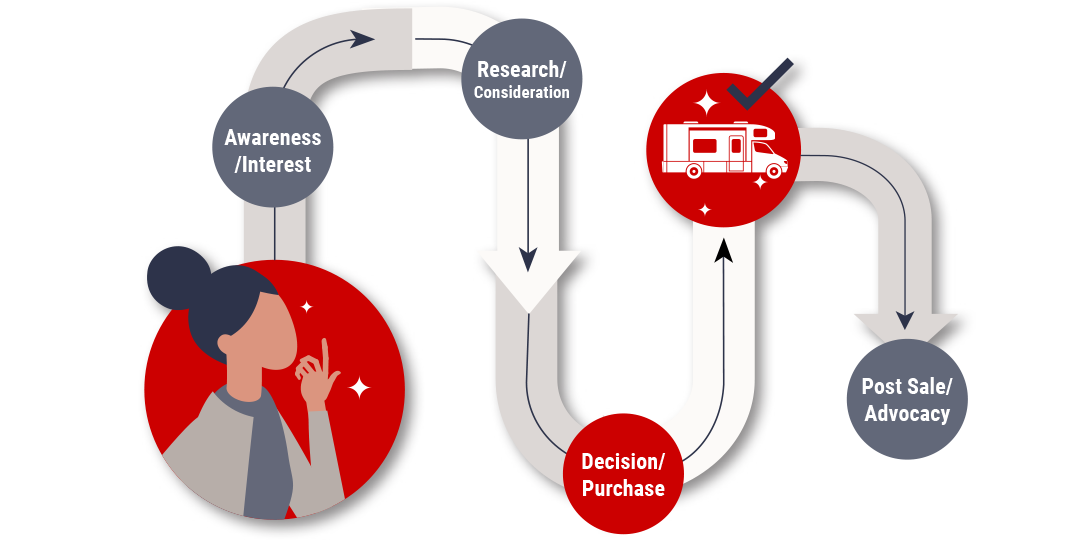
The Buyer’s Journey Part 2: Engaging with Buyers in the Purchase Phase
The Buyer’s Journey should be a key focus for marketing any business, including your RV dealership. At its heart, the Buyer’s Journey is the sales funnel from your buyer’s perspective. Understanding how buyers process their purchase decisions and how you can support them as they shop is important.
At the decision-making/purchase stage, buyers are solidifying their choice. So, what are buyers looking for from your dealership in this phase? And what can you do to ensure they choose your dealership to purchase from? In part two of our three-part series on the buying journey, RVT shares some tips for engaging buyers in the decision-making and purchase phase.
By the time buyers have reached the decision-making/purchase phase of the journey, they have typically researched units, read reviews about model(s) and dealerships, received opinions from family and friends, and established their price limit. At this point, they may know exactly which make, model, and floorplan they want to buy, or they might only have determined the type of RV they want, but are ready to purchase if they see the right one.
They’ve entered your dealership—make sure they want to invest with you.
Maximizing Buyer Experience
Walking into your dealership with the intent to purchase doesn’t guarantee a buyer will buy from you. Buyers want to feel confident and comfortable with their decision. It’s important to create a solid rapport, establishing you as a trustworthy advisor. So how do you create an ideal buyer experience that will help them choose your dealership?
- Listen to your buyer. This is so crucial, it requires extra emphasis. Active listening is vital for understanding what your buyer is—or isn’t—saying. It lets your customers know that you care and want to help, rather than just sell them a unit. Salespeople typically talk about 80% of the time, which leaves customers a mere 20% to express themselves. Try reducing the amount you speak.
Listen to their words, watch their posture and other non-verbal cues, suss out their pain points, and help them find the solution: the best possible RV for their lifestyle. Listening well allows you to make more solid recommendations and bring up points your prospect may not be thinking about. When you listen, rather than just hear, your potential buyer will feel acknowledged, understood, and the bond of trust will be deeper. - Establish yourself as a reliable authority by listening, answering questions, and sharing your knowledge. Know your inventory well. Keep in mind, buyers don’t like a hard sell at any point in their journey. Support their choices without being pushy.
- Offer valuable tips for getting the most out of their new RV. Whether it’s tips for set up, maximizing storage, or destinations you’ve enjoyed, sharing tips further builds your relationship, especially with RV newcomers.
- Emphasize the benefits of purchasing from your dealership. Explain any special offers, perks, partnerships, or programs your dealership offers.
- Make sure your buyer understands the financing and insurance options available to them. For many buyers, this is a critical component. Discuss warranties, payment plans, and service contract options in a concise, easy-to-understand manner.
Keep all communication with buyers open and straight-forward. Don’t use pressure or confusing language. Don’t make promises you can’t keep. Your buyers will appreciate honest, above board communication.
Reaching Dealership-Shy Buyers
Some purchase-ready buyers won’t enter a dealership until they have every duck in a row. They may be concerned about pushy salespeople or may have had a poor previous experience. How can you reach buyers who are dealership shy? A digital presence may help.
- Share the benefits of buying from your dealership on your social media accounts and dealership website, and keep those sources up-to-date. Positive testimonials from previous customers will help support your claims.
- Advertising on trusted sites like RVT can help build brand awareness and may help overcome objections at a distance. Dealership perks, special offers, and financing options are excellent advertising subjects
Providing Exceptional Follow Through
Once your buyers have signed on the dotted line, your job isn’t finished. As a dealership, you need to have great follow through from the time they sign the papers onward.
- Walkthrough: Be sure their unit is in top condition before it ever leaves the lot. Do a thorough, hands-on walkthrough of the unit with your buyer. Take note of anything that isn’t up to par and ensure that it’s fixed properly before pick up.
- Pick Up: Make sure that all buyer concerns have been addressed. Top dealerships don’t let buyers leave with a unit that still needs repairs. The quickest way to an unhappy customer is by not following through with promises made during the sales process.
- Touch Base: Within two weeks of the pick up, take time to follow up with your buyer. Make sure everything is running smoothly with their new rig and they have no complaints. If issues arise, promptly address them. After-sales care is as important as the pre-sale.
How your buyer feels at the purchase and pick-up stages sets the tone for the aftersale. Will you develop a repeat customer, or someone who speaks negatively about your dealership on review sites? Ultimately, top dealerships recognize that a sale is an opportunity for a continued relationship with their buyers. They take steps to ensure they return for parts, service, and eventually, a new unit. Taking good care of your customers is the best way to ensure they return.
In September, RVT will examine how to create a solid post-sale experience and get those all-important testimonials and word-of-mouth recommendations in part three of our three-part series on The Buyer’s Journey.
Ready to set your dealership up for optimal exposure and views via the RVT marketplace?
Contact us today to request personalized, one-on-one consultation rvt.com/consult


